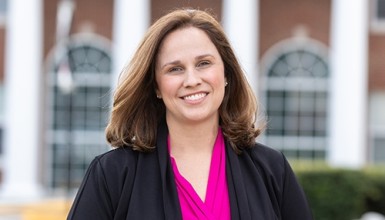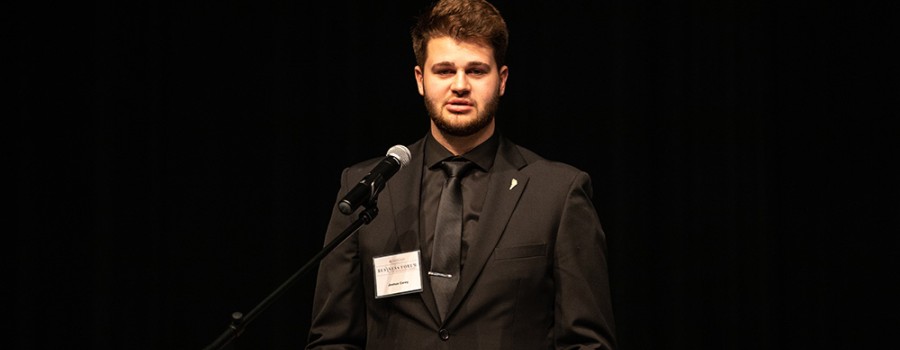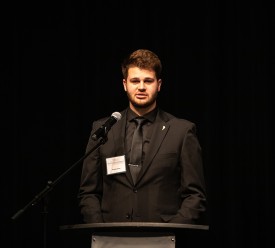Unlock your political potential and use it to improve society.
By studying various topics – from governmental systems to international relations to political behaviors – you will not only learn how the political sphere operates, but you will also make yourself valuable to future employers. Through your bachelor’s degree in political science program, you will learn all about diplomacy, strategy, international politics, political theory, and much more. But it doesn’t stop there. With a political science degree, you can venture into almost any career field with better researching, writing, and public speaking skills. You don’t have to become a big-time politician; you just have to take the next step. After graduating with your bachelor’s in political science, you will be set to make your mark on society. This could be the place where it all starts.
By the Numbers
Programs & Requirements
* The credit hours listed on this page only reference the specific program requirements and is not reflective of the total hours necessary to receive your political science bachelor's degree. Cumberlands requires all students obtain a minimum of 60 hours for an associate’s degree and a total of 120 hours for a bachelor’s degree in political science. Transfer and prior learning credits may be counted toward those totals.
To learn more about our General Education Requirements, please visit the page referenced below or explore our Academic Catalog.
Bachelor of Science in Political Science
Explore the intricacies of politics and get inside the minds of world leaders as you navigate courses that will teach you how government systems work at their cores. Grow in your political and relational capabilities as you learn how to conduct important research and understand what it means to interact with people on an international scale. The knowledge and skills you gain through a bachelor's degree in political science will equip you to help countless people over the years, making a lasting impact in societies around the U.S. — maybe even the world. With a mind prepped for taking on challenges and overcoming expectations, you will take on whichever governmental role you desire and take a leap toward changing the world for the better.
Course Requirements
- POLS 131 - Introduction to Political Science
- POLS 233 - American National Government
- POLS 235 - Introduction to International Relations r
- HIST 224 - Research Mechanics
- HIST 225 - Research Composition
- POLS 490 - Senior Research Composition
- POLS 433 - Constitutional Law OR POLS 434 - Western Political Theory II
- Choose 18 Elective Credit Hours from the political science offerings of the department
A Bachelor of Arts in Political Science requires completing the same courses as a Bachelor of Science with the addition of completing one foreign language sequence through the intermediate level.
- FREN 131 Elementary French I
- FREN 132 Elementary French II
- FREN 231 Intermediate French I
- FREN 232 Intermediate French II
- SPAN 131 Elementary Spanish I
- SPAN 132 Elementary Spanish II
- SPAN 231 Intermediate Spanish I
- SPAN 232 Intermediate Spanish II
Minor in Political Science
Interested in politics but don’t know if you want to make a career out of it? Not a problem! University of the Cumberlands offers a political science minor that gives you the experience of learning what politics, national and international relations, and governmental systems have to offer on a smaller scale so that you’re free to major in whatever else you’d like. A minor in political science will make you stand out on any résumé and guarantee your chances of being successful in the workforce, no matter what professional avenue you take.
Course Requirements
- POLS 131 - Introduction to Political Science
- POLS 233 - American National Government
- POLS 235 - Introduction to International Relations
- POLS 433 - Western Political Theory I OR
- POLS 434 - Western Political Theory II OR
- POLS 436 - Political Ideologies
- Choose an Additional 12 Credit Hours from the Political Science courses.
Take the Next Step
Mission & Goals
The mission of the bachelor's in political science program at Cumberlands is to teach you the structures and policies of government to prepare you to work in both politics and other areas. Through this program, you will gain:
Political Science Careers & Outcomes
*All statistics from the U.S. Bureau of Labor and Statistics
Political Scientist: $122,510
Political Scientist: $122,510
Political scientists study the origin, development, and operation of political systems. They research political ideas and analyze governments, policies, political trends, and related issues.
Professor: $79,640
Professor: $79,640
Postsecondary teachers instruct students in a variety of academic subjects beyond the high school level. They may also conduct research and publish scholarly papers and books.
Lawyer: $127,990
Lawyer: $127,990
Lawyers, also called attorneys, research the intent of laws and judicial decisions and determine whether they apply to the specific circumstances of their client’s case. They act as both advocates and advisors for one party in a criminal (offense against the state or the nation) or civil (matters between individuals or organizations) proceeding.
News Analyst: $48,370
News Analyst: $48,370
News analysts, reporters, and journalists keep the public updated about current events and noteworthy information. They report international, national, and local news for newspapers, magazines, websites, television, and radio.
Historian: $63,940
Historian: $63,940
Historians conduct research and analysis for governments, businesses, individuals, nonprofits, historical associations, and other organizations. They use a variety of sources in their work, including government and institutional records, newspapers, photographs, interviews, films, and unpublished manuscripts, such as personal diaries, letters, and other primary source documents. They also may process, catalog, and archive these documents and artifacts.
Operations Research Analyst: $82,360
Operations Research Analyst: $82,360
Operations research analysts may be involved in many aspects of an organization. For example, they may help managers decide how to allocate resources, develop production schedules, oversee the supply chain, and set prices.
Common Questions
A political science degree is a social science program that focuses on studying governments, political systems, laws, and political behavior. It covers topics like diplomacy, political theory, international relations, and political processes, helping students understand the workings of both national and international political institutions.
A political science degree typically takes four years to complete, assuming full-time enrollment. It requires a total of 120 credit hours, including general education requirements and program-specific courses.
While the specific program mentioned is on-campus, many institutions offer online political science degree programs. It's advisable to research online options if you're interested in a flexible learning environment.
A political science degree can be worth it, depending on your career goals. It opens doors to various career opportunities in law, government, journalism, education, and business. The skills you gain, such as critical thinking, research, and public speaking, are highly transferable and valued in many fields. Political scientists, for example, earn an average salary of $122,510, making it a potentially rewarding investment.
With a political science degree, you can pursue careers as a political scientist, lawyer, professor, news analyst, historian, operations research analyst, and more. It prepares you for roles in government, non-profit organizations, international relations, education, and media.
To earn a political science degree, you need to apply to a university offering the program and meet the admission requirements. Once accepted, you will complete general education courses along with major-specific courses in political theory, international relations, government systems, and political behavior.
Both a Bachelor of Arts (BA) and a Bachelor of Science (BS) in Political Science are valuable, but they differ slightly. A BA typically has a broader liberal arts focus, including courses in humanities and foreign languages, while a BS may have more emphasis on quantitative skills and research methods. The choice depends on your career goals and interests.
While it can be competitive to find certain positions, a political science degree equips you with versatile skills like critical thinking, communication, and research, which are in demand across various industries. Graduates often find jobs in law, government, education, journalism, and business. Networking and internships can also enhance your employability.
Faculty Experts in Political Science
Learn more about the political science professors you will interact with.

Dr. John D. Wineland

Catherine Ball, JD

Dr. Michael Spurlock
Request Information
Learn more about all that Cumberlands has to offer.

